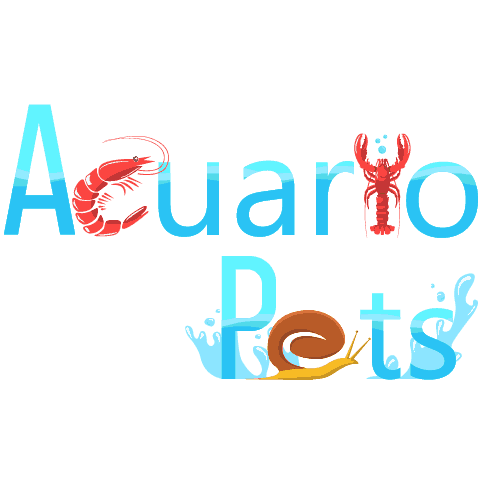9 Foods That Are Toxic For Chameleons
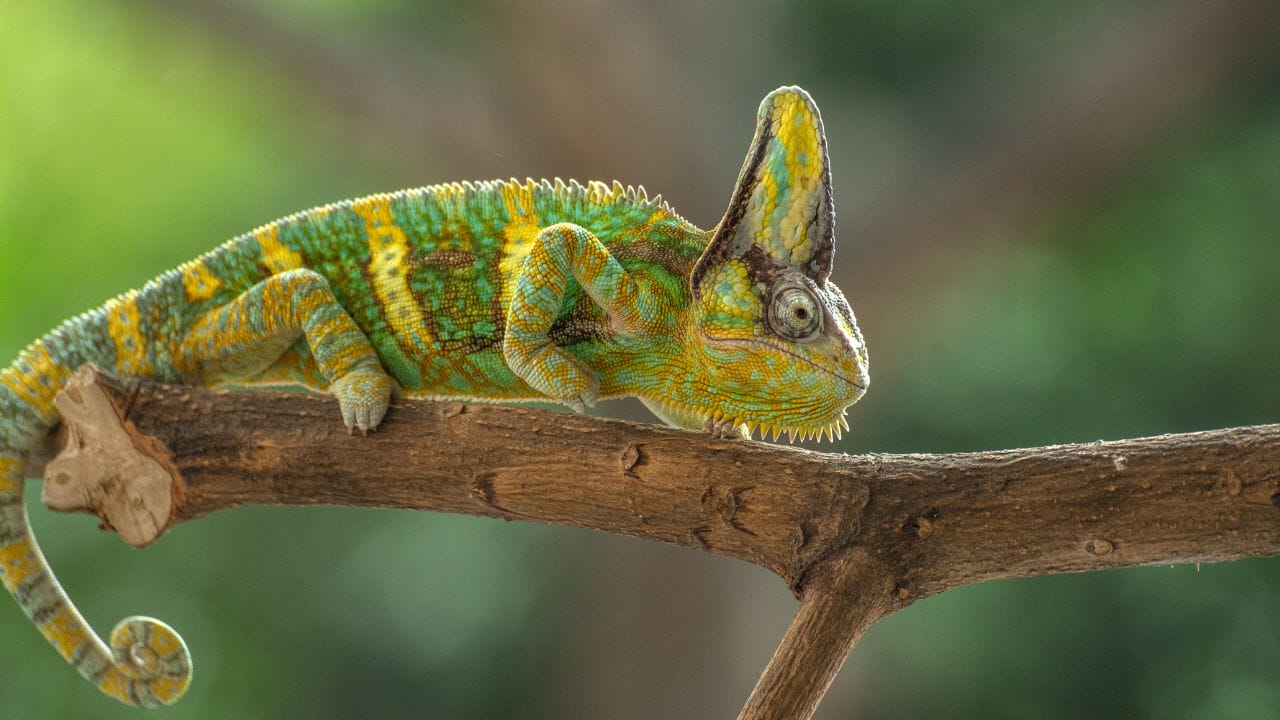
Foods can kill your chameleon! Hold on a second! We didn’t mean those nutritious foods you’re feeding them, which don’t only keep them healthy but also make them better day by day. But what about toxic ones? By the way, which foods actually are toxic for chameleons?
Well, there are a bunch of foods like chocolate, avocado, and caffeine that are literally toxic for chameleons. Even a bit of them can make your reptile sick. Apart from these, vegetables like cabbage, iceberg lettuce, figs, apricots, and spinach will also have a negative impact on your reptile’s health.
But how can these actually be that much harmful when other animals can consume them easily? And if they’re so bad, which foods should you actually feed your reptile? Well, it’s time to find that out!
Top 9 Toxic Foods for Your Chameleon
If you want to keep your chameleon healthy, not only should you give it the right food, but you should also keep it away from the wrong ones, including –
1. Chocolates
We don’t think you’re going to find too many people on earth who don’t like chocolate. But the chameleon? Well, they hate it, and to be honest, they’ve got some solid reasons for that too. If you’ve had the chance to run any research on chocolate, we bet you saw the name of a compound in there known as theobromine.
This compound is literally too toxic for these color shifters. Once this one goes in, it can trigger major health issues like seizures and heart palpitations. And the worst-case scenario? It can kill your chameleon.
Hold on a second! Theobromine isn’t the only culprit when it comes to feeding chocolate to a chameleon. It comes with caffeine, which we bet you’ve heard about before, and can also cause several health issues as chameleons can’t simply metabolize this compound. So, you better keep your reptile away from anything made of chocolate.
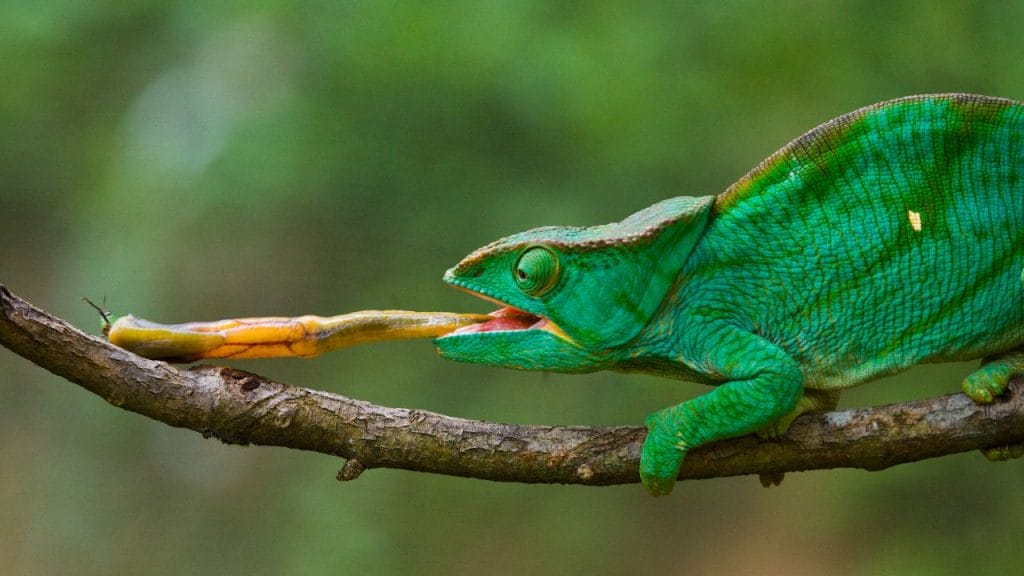
2. Avocado
When it comes to healthy food, lots of people love taking the name of Avocado. But that doesn’t mean what is good for humans will also be good for reptiles, especially chameleons.
Avocado comes with a substance known as persin. This substance is so toxic for chameleons that it can cause major health issues for chameleons including difficulty breathing and fluid accumulation in the reptile’s chest and abdomen.
And guess what the similarity between chocolate and avocado is? Well, this one, too, can kill a chameleon. So, if you’re feeding it to your chameleon, even if the smallest piece, it can be catastrophic for the reptile’s health.
3. Cabbage
We bet you’re a bit surprised to see the name of cabbage on this list. Well, they’re not exactly toxic for chameleons. But that doesn’t mean you’re free to feed them with it. The thing is, cabbage comes with goitrogens, and it can mess with the functionality of the reptile’s thyroid gland.
On top of that, chameleons need a diet rich in protein and calcium but low in fat. But when it comes to cabbage, it simply doesn’t fit into that category and fails to provide the required nutrients. So, the best thing you can do is stick to the leafy greens and live insects, which will work as a fine source of nutrition for the reptile.
4. Figs
No, figs don’t kill chameleons. But that doesn’t mean they’re among the recommended foods either. After all, they fall short of necessary nutrients which can actually keep a chameleon active.
But that’s not the only drawback of figs. They can trigger digestive issues in a chameleon and can make them quite sick. So, as we suggested for cabbage, we’ll say the same for figs as well. Don’t even think about adding them to your reptile’s diet or experimenting with them.
5. Citrus Fruits
Let’s call it more of ‘not recommended’ food rather than ‘toxic’. You already know these reptiles are insectivores. This means they simply love to live on insects. After all, that’s the best possible source of their nutrition. But we can’t say the same thing about citrus fruits.
Not only do these fruits fail to deliver inadequate nutrition, but they can also be pretty much acidic for your reptiles. So, if you really don’t want your chameleon to roam with an upset digestive system, don’t put these fruits on their diet chart.
6. Raw Beans
Naming it one of the worst nemesis of chameleons won’t be anything wrong. It’s nothing, but the lectin it contains works as the culprit. Actually, this substance brings digestive issues to reptiles. Once you give your chameleon high amounts of it, the reptile can end up with diarrhea and vomiting.
7. Alcohol
We know, as a concerned chameleon owner, you’ll never throw something like this at your reptile. But still, you better know why you should keep alcohol from your chameleon in every possible way. It can severely affect your chameleon’s central nervous system, which later on triggers brain damage.
But that’s not all! Alcohol is so toxic for your chameleon that it can cause respiratory distress along with kidney and liver damage. On top of that, it can negatively affect the reptile’s fluid balance. This means even a drop of alcohol can lead to dehydration.
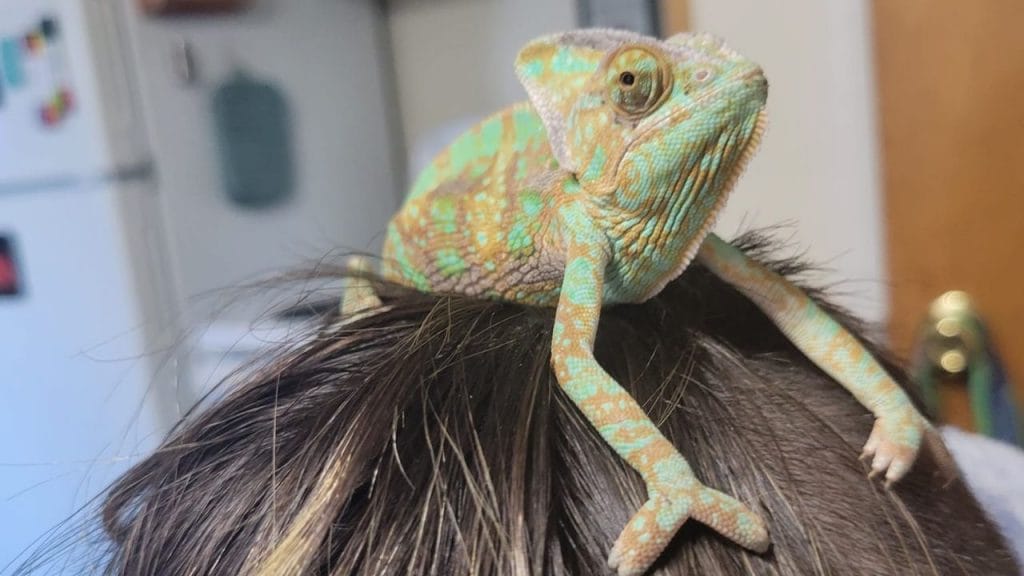
8. Onions And Garlic
Have you ever heard of compounds called organosulfoxides? Well, that’s what onions and garlic come with. And if you’re asking about the effect on reptiles, it can trigger both digestive issues and respiratory problems. This means if you ever feed them to your chameleon, it’ll have to deal with them too.
Hold on a second! That’s not the end of the story. Along with triggering digestive upsetness, onions and garlic can cause diarrhea and vomiting as well. But are these the worst possible outcome? Not at all! Letting them slip into your chameleon’s stomach can cause red blood cell damage and anemia, which eventually can kill your favorite color shifter.
9. Dairy Products
It’s true that chameleons can digest lots of foods, but dairy products surely aren’t on that list. As there’s a lack of the enzyme called lactase in chameleons, which helps in breaking down lactose in milk, and they end up in digestive upsetness. Things can go so bad that the reptile can suffer from abdominal pain, bloating, and diarrhea. At times the situation can end up in life-threatening complications.
Can Chameleons Eat Human Food?
Who doesn’t like to let their pet have a bite from their food, whether it’s a cat or a dog? But what about chameleons? Well, you already know that chameleons are insectivores and mostly live on insects, including moths, crickets, grasshoppers, and mealworms. But letting them eat human food is surely not recommended.
That’s for one of two reasons. First, not all human foods are digestive for chameleons and can make them really sick. After reading the upper segment in this article, you’ve probably already got some idea about that. Two, they don’t always meet the reptile’s nutritional needs.
Now the question is, can you never give your chameleon a treat from your food? Well, yes, you can. But for that, you need to stick to a certain list of foods. Before getting you that, you need to promise that you won’t be feeding them those foods frequently.
That’s because feeding them frequently can lead to major health issues, and you never know which one of those might even kill them. So, it’s best to go with the diet suited for the reptile’s health.
But if you really can’t help sharing a bit of your food with them, make sure you’re giving them something like small pieces of mango, Papaya, or peaches. You can also try pears, bananas, grapes, melons, berries, and squash. Foods like carrots, sweet potatoes, lettuce, and endive are also okay.
Some of the chameleon owners also prefer feeding them apples. There’s nothing wrong with apples, but you better take out the seeds first. Once again, the best use of these foods is as a treat. But if you put them in the chameleon’s regular diet, be ready to see your lizard sick.
It’s always better to give them foods that are high in protein, and the ones we’ve mentioned above aren’t definitely anything up to that mark. So, think of live insects first while decorating the food chart in order to maintain their proper health. If you’ve got any confusion about the reptile’s dietary needs, you better give your veterinarian a call.
Which Foods Are Best for A Chameleon’s Diet?
The best way to save chameleons from toxic food is to stick to the best foods. But for that, you need to be sure about the right foods first. To give your reptile its best health, you can add these foods to its diet.
1. Grasshoppers
When you’re asking for a food that can get your chameleon high levels of protein and ensure proper growth, we can’t think of a better name than grasshoppers. On top of that, they work as the perfect source of required minerals and vitamins, including calcium and phosphorus, and you already know how important they are for ensuring the reptile’s healthy bones.
But we won’t suggest feeding them without any moderation. After all, excessive feeding of any food can trigger health issues in a chameleon. Plus, it’s better to dust the insects with a bit of calcium supplement will ensure getting proper nutrients.
2. Crickets
If you’re going to ask any vet about the best insect to feed your chameleon, we bet they’ll take the name of crickets first. Just like the grasshoppers, they too are rich in proteins, and there’s nothing new to say about that how important it is for the reptile’s growth.
But the reason why we’re calling it among the best foods is that it comes with phosphorus, calcium, and vitamins B & E. If you’ve done your share of research, you should know these vitamins and minerals not only make the reptile’s immune system but also take care of its bones and overall health.
3. Silkworms
Are you looking for something easily digestible but also comes with a high-protein value? Well, we say then you better try the silkworms. But if you’re planning to hold it as the only food source for your chameleon, then we say you better skip that idea,
Actually, these worms aren’t enough to deliver all the essential nutrients you need for your chameleon. So, along with adding other foods like roaches, crickets, and leafy greens, you better make the silkworms gut-loaded with a nutritious diet before feeding them to the chameleon. And don’t forget to dust them with a calcium supplement as well.
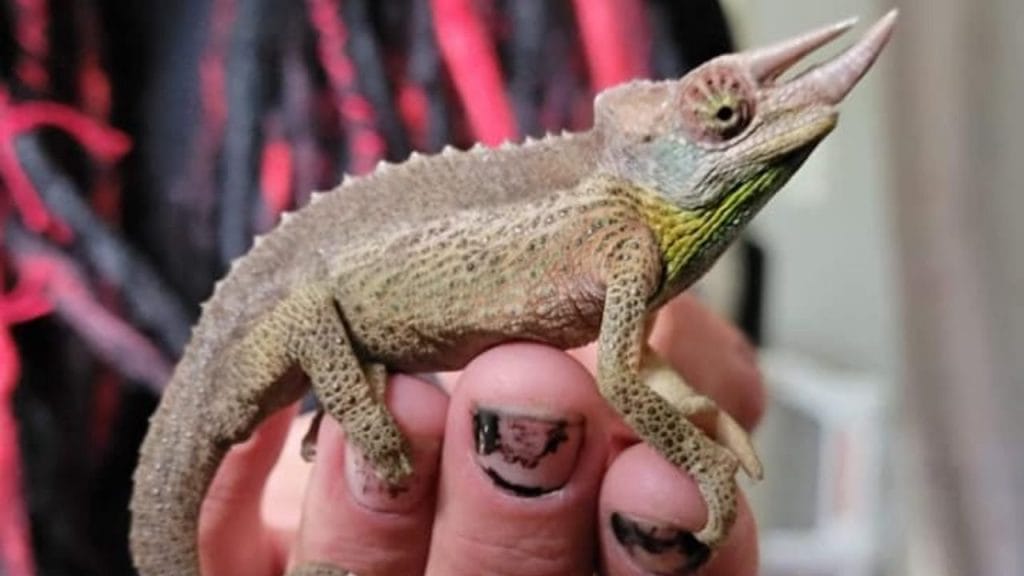
4. Mealworms
Mealworms are rich in Omega 3 fatty acids. In other words, if you want to give your lizard a leg up when it comes to its joint and bone health, this is the perfect food item for you. Additionally, the reptile’s eyes and skin will benefit from this.
On top of that, For chameleons to digest proteins and lipids, these insects can be an ideal source of vitamin B. After all, not only their metabolism but also energy production would suffer without it. Furthermore, it aids in maintaining the health of their eyes, skin, and muscles.
5. Collard Greens
Who said chameleons don’t love leafy greens just because they’re insectivorous? Well, they do, and Collard greens are on that list. Collard greens come with Vitamin A. This means your reptile is going to get some solid support for improving its vision and immune system function.
Plus, it’s filled with Vitamin C as well. So, not only it’ll help your reptile in having a better immune system function, but it will also assist in tissue repair. Thanks to the Calcium it comes with, the development and maintenance of strong bones of your reptile will become easier. Besides, the fiber within will also make its digestive health better.
Before You Go…..
When it comes to picking the right food for your reptile, things can be really confusing. We bet, at times, you face the same thing, especially when it comes to worms. Well, we think we can help you out with that a bit.
Read our blog Can Chameleons Eat Worms? And find out all your answers about the safer worms for your chameleon.
About Author
Hello, I’m Muntaseer Rahman, the owner of AcuarioPets.com. I’m passionate about aquarium pets like shrimps, snails, crabs, and crayfish. I’ve created this website to share my expertise and help you provide better care for these amazing pets.
Disclaimer
This site is owned and operated by Muntaseer Rahman. AcuarioPets.com is a participant in the Amazon Services LLC Associates Program, an affiliate advertising program designed to provide a means for sites to earn advertising fees by advertising and linking to Amazon.com. This site also participates in other affiliate programs and is compensated for referring traffic and business to these companies.
